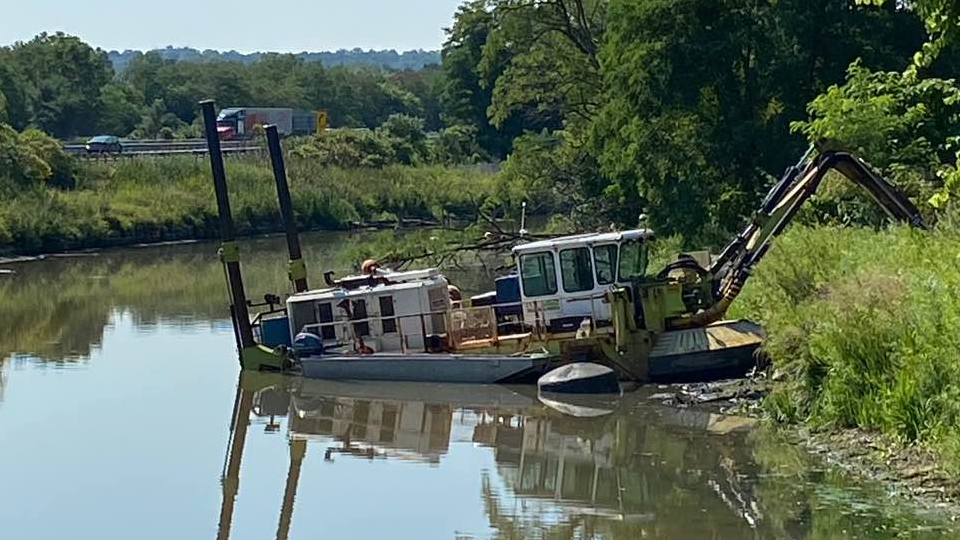The Six Nations group that’s cited treaty rights as a reason to slow the City of Hamilton’s remediation work in Chedoke Creek says it’s committed to good faith and willing to sit down with the city to discuss issues.

Haudenosaunee Development Institute (HDI) spokesperson Aaron Detlor told Global News “the issues” surround clarity and specifics of the cleanup work the city is undertaking following the dropping of a dredging machine into the waterway near Kay Drage Park on Monday.
“We don’t even know if this is a cleanup,” said Detlor.
“We really have no insight into what’s happening right now because we’ve been excluded from the process.”
The Haudenosaunee Confederacy Chiefs Council, which HDI represents, contest they should have been included in a discussion about how the cleanup impacts area treaty rights.
They’ve also stated the Chiefs Council does not recognize the provincial government’s jurisdiction and are asking for a pause on dredging work.
Detlor insists the Dish with One Spoon Wampum Belt Covenant treaty with the Anishinaabe, Mississaugas and Haudenosaunee in addition to the Between the Lakes Purchase treaty with the Mississaugas of the Credit First Nation of 1792 are the agreements in play.
“There’s certainly no attempt to impede work or otherwise interfere with what’s going on the site,” said Detlor.

Get daily National news
“What we’re really trying to do is what should have been done in the first place, to have a discussion about how this impacts treaty rights.”
The City of Hamilton has until Dec. 31 to complete a cleanup of Chedoke Creek in alignment with an order issued by the Ministry of Environment, Conservation and Parks tied to a 24-billion litre spill of untreated sewage and stormwater over four years.
Staff told Global News they have consulted with a range of stakeholders, including the Hamilton Conservation Authority and Royal Botanical Gardens, Ontario’s Ministry of Transportation, Fisheries and Oceans Canada, and Indigenous Nations and partners, including Six Nations of the Grand River and the Haudenosaunee Confederacy Council.
In July, the city hired Canadian-based soil and groundwater remediation specialists Milestone Environmental Contracting Inc. to do the work for an estimated $6 million
The dredging was expected to begin last week and take four to five months to complete.
A city spokesperson confirmed the operation has slowed but expects work to resume in the near future as it continues working with the HDI on a request for an “Environmental Monitoring Agreement.”
“The City also continues to consult with the Ministry of the Environment, Conservation and Parks (MECP) regarding what is required, and has updated MECP staff with respect to the work stoppage and the status of the project,” spokesperson Jen Recine told Global News in an email.
Ontario’s Ministry of Environment previously told Global News it “has no role in providing guidance in this matter” and will be leaving discussions in the hands of city officials.
City staff are also continuing to meet and discuss options with all key stakeholders to determine best way forward that enables the City to meet the MECP’s requirements under the order.
Detlor says enforcing the treaty rights would equate to walking the project site with treaty stakeholders and determining the cumulative impacts of the contractors’ work.
“Determining what flora and fauna are present on the site, and to get a broad understanding of how the project impacts into a wider-scale assessment of treaty rights,” Detlor said.













Comments